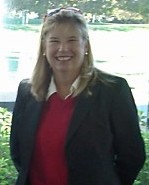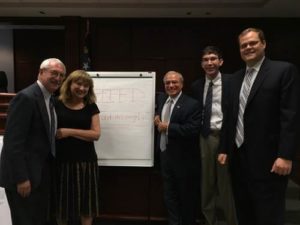The following post was authored by Sandy Moonert and is being shared with permission from our partner, Enable America.
During this the 25th Anniversary year of the Americans with Disabilities Act (ADA), a recent court decision in Raleigh North Carolina further highlights the need for employee and employer education about the rights granted under this historic legislation for those who are ‘differently abled’. It would appear that there has not been as much progress as we might hope over the last 25 years.
Dr. Eric Rappaport was a successful obstetrics and gynecology medical doctor for over 20 years – at the same practice with fellow physicians who were also friends, treating patients for a lifetime, and becoming an extended family member of many young families. His world changed in 2008 when diagnosed with Parkinsons Disease. Overnight, not only did his own health and mental strength become a battlefield – but he was soon in a fight for his job with those same fellow practice physicians with whom he had shared so much success over 20 years. Until then he had had very little exposure to the topic and world of ‘disability’.
“My day in court” said Dr. Rappaport “was my chance to tell the truth about how I was treated when I was labeled a person with a disability. For three long years of unfair treatment, unlawful retaliation, and eventual wrongful termination by my employer – I finally could tell my side of the story. That testimony alone was a watershed event for me, but I now realize how important this case and decision will be for anyone who is ‘differently abled’.”
Dr. Rappaport sued his employer for wrongful termination and retaliation and after a three-week jury trial in July-August 2015 – the jury weighed the evidence and testimony and levied a judgement against the employer in favor of Dr. Rappaport. “The most difficult awareness for me,” continued Rappaport, “was the degree, extreme actions members of the practice undertook to marginalize me – making sure I knew I was no longer part of the team. I joined the group out of residency to be with other physicians in a team environment and they purposefully took that away from me. Even though I had been accredited to continue practicing with mild Parkinsons Disease, they as much as said I was no longer a valued member of the team. That’s inhumane and not the kind of society I want to live in.”
In Dr. Rappaport’s case, the evidence showed a systematic attempt to discredit him and otherwise loyal co-workers seemed to tote the company line. “It was hard to see fellow employees now supporting the company line or dangerous ‘groupthink’,” said Rappaport. “Whether they were protecting their own jobs or simply trying to support the management view, I fear some of my co-workers got caught up in dangerous group think and didn’t stand their own ground.”
As an employee with a new disability – or now differently able – Dr. Rappaport experienced firsthand the lack of understanding from his fellow employees and employer. “We should not view people with disabilities as having no value but rather focus on the value they bring and add to the workplace. I am terrified of being defined by Parkinsons Disease, an illness” Dr. Rappaport offered. “I encourage employees who find themselves in a similar situation – suddenly differently able – to first and foremost recognize that you do not lose value and stand up for yourself. We all know too well what we cannot do; focus on what we can do and do that the very best we can, and often better than others. Likewise I encourage employers to recognize what differently abled employees can do and the unique value they bring to an organization and the other employees in that organization. In this way we will become a better, ‘can-do’ society valuing everyone for what they can contribute.”
Today Dr. Rappaport continues to practice medicine in a new practice, facing an uncertain future with Parkinsons Disease. He will only engage in medical practices that he is capable of delivering extremely well. He is thankful for the jury’s verdict in his favor because of the message it sends to employees and employers alike and the catalyst he might be for the differently abled to stand up and be recognized for the valuable workers and people they are. “I could not have faced the inhumane treatment and the ensuing jury trial if it had not been for the love and support of my wife, two sons and long-time friends. When all of the facts came out at trial, a close friend said ‘I had no idea what you were going through at the time, you were so strong’.” Rappaport continued “I am so appreciative for the love and support from so many people that has been directed at me – I look forward to giving back to this deserving community.”
 Sandy Moonert, North Carolina Program Director for Enable America, brings over 20 years business experience to the mission of connecting wounded warriors, disabled veterans and individuals with disabilities to employment opportunities. She has served over 500 North Carolinians with disabilities by managing Enable America action-based programs with over 40 employers and 200 employee mentors; organizing Job Seeker Workshops recruiting volunteer presenters from business and disability communities; and connecting with more than 50 veteran and social service agencies and colleges and universities. Previously employed as a software sales and marketing professional at SAS, Misys Healthcare and LexisNexis, Sandy has been with Enable America since 2009.
Sandy Moonert, North Carolina Program Director for Enable America, brings over 20 years business experience to the mission of connecting wounded warriors, disabled veterans and individuals with disabilities to employment opportunities. She has served over 500 North Carolinians with disabilities by managing Enable America action-based programs with over 40 employers and 200 employee mentors; organizing Job Seeker Workshops recruiting volunteer presenters from business and disability communities; and connecting with more than 50 veteran and social service agencies and colleges and universities. Previously employed as a software sales and marketing professional at SAS, Misys Healthcare and LexisNexis, Sandy has been with Enable America since 2009.


